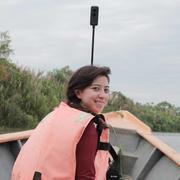How Christina Chang shifted from cold showers to tech development in her quest for a more sustainable world.
As a kid, Christina Chang was already a mini-sustainability activist. She recycled and reused. She turned lights off in empty rooms. She screened “Captain Planet and the Planeteers” at her school on Earth Day. And, for two years in high school, she showered sustainability-style, turning the water on just long enough to get wet, then lather up, and rinse off under a quick burst of cold water.
“I was unwarrantedly stoically proud of my extreme shower practices,” Chang said, “until I learned about the order of magnitude that is needed to make a real difference.”
Most individuals won’t clench through two years of sustainability showers. But it doesn’t matter. Compared to industrial production, livestock farms, and highways jammed with cars, a cold shower won’t foot the climate bill. That power gap might deflate the most ardent environmentalist, but for Chang, it was a call to action: Instead of just changing her behavior, she set out to change the aluminum and steel mills, coal plants, and concrete and plastic industries.
“I realized that my habits as an individual will not make a big enough difference to matter,” Chang said, “but maybe my inventions could.”
As an undergraduate at Princeton University, she invented a water decontamination process. As a master’s student and Marshall Scholar at Cambridge University, she created a new solar-to-hydrogen technology. Then, as a chemistry Ph.D. candidate in the Harvard Graduate School of Arts and Sciences (GSAS) she co-invented a method that could enable the production of cheaper, longer-lasting solar panels that can be mass produced at a rate of a few feet per minute.
“Switching from fossil fuels to renewable energy has many benefits,” Chang said, “but it’s still somewhat expensive for the majority of people.” Her invention could drop the price and speed production.
“I realized that my habits as an individual will not make a big enough difference to matter, but maybe my inventions could.” |
— Christina Chang, Ph.D. '20 |
Yet that was still not enough. Chang filled her nights and weekends chasing curiosities that extended beyond her Ph.D. work and even beyond her discipline. When she learned how much carbon dioxide the steel industry emits — production generates between 7 and 9 percent of global emissions, according to steel industry figures — she invented a sustainable chemical steel manufacturing process that could decrease those emissions. Her side project won the 2019 President’s Innovation Challenge Ingenuity Award for ideas with potential to be world-changing. “The only way [the world] gets better,” said Harvard President Larry Bacow in his introductory remarks at the award ceremony, “is if good people like you are willing to make it so.”
Chang is willing and more than able. At Harvard, she was president of the chemistry department’s Graduate Student and Postdoctoral Council for two years and then president of the Energy Journal Club for another two.
Curious about psychological techniques to promote sustainability, she co-founded a cross-disciplinary conference called “Nudging Toward a Cleaner Future.” In March, she received her Ph.D. in chemistry, surprising no one.
Though Chang decided to devote her life to sustainable technology at 19, that wasn’t her first unshakable commitment. At age 12, she decided to become fluent in Spanish and, with help from the Spanish-speaking residents in her native Austin, Texas, she did.
At Harvard, to maintain a self-imposed rule to practice Spanish (and French) at least once every week, she co-organized GSAS Spanish and French language tables for fellow linguaphiles. Recently, her Spanish skills faced a high-stakes test.
Two years ago, she found a new devotion: rock climbing, which she said taught her to plan for risk and prepare back-up systems for inevitable failures.
In January, after defending her dissertation, Chang packed a backpack with clothes, anti-malarial pills, rock-climbing gear, sunblock, her passport, and 12 Clif Bars, and flew to Peru on a one-way ticket. When people asked if she felt safe as a woman traveling alone in Latin America, she said, “I hang off sheer rock faces — this trip is way less scary.”

